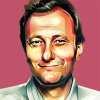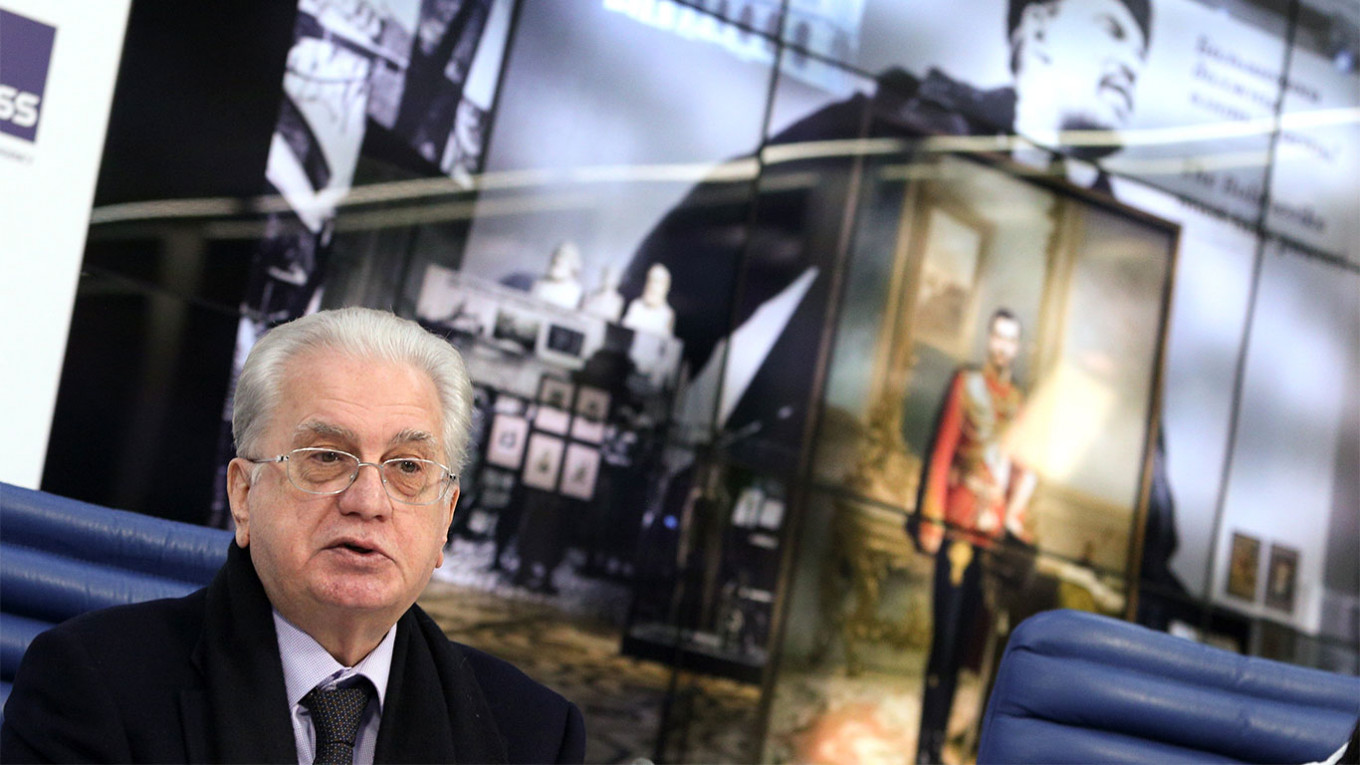This article was first published in The New Times.
Mikhail Piotrovsky, the director of the State Hermitage Museum, joined Vladimir Putin, Security Council chief Nikolai Patrushev, Patriarch Kirill and former culture minister Vladimir Medinsky in the role of heavy artillery to justify ideologically Russia’s choice of civilization: self-isolation and an archaic militarized state.
Mikhail Piotrovsky has been director of the Hermitage for 30 years — longer than Vladimir Putin has been president, and longer than his father, Boris Piotrovsky, was director of the Hermitage before him.
Unlike "Putin, Patrushev and Co." — the ideology business that has created an imaginary world with mythologized history and fictitious development goals — Mikhail Piotrovsky is the epitome of intellectualism with a brilliant education in the humanities.
But knowledge of five living languages and several ancient ones does not exempt him from public service. And being director of the Hermitage is a service profession. It is a showcase for the country — if you understand the country as separate from the government — and for the government. The government comes first. The job is like being an usher at the Bolshoi Theater, showing figures important to the government to their box, only here they are taken up the grand staircase into the Hermitage. Here is Piotrovsky accompanying Tony Blair, here is George Bush, here is Kim Jong Il, here is Gundyaev, not yet patriarch and not yet with a white beard... It is service to the state.
Serving the state in the dark times of today’s Russia means simplifying word and deed, getting down to the level of uneducated people. This has always been the case in history.
At first shocked and awed, the Russian elite waited and watched the "special military operation.” When they saw that it was dragging on, they realized that there was no hope of getting back to their former lives. So they ignored their instinctive reaction and, with a heavy sigh, took sides. Putin's bankers, Putin's oligarchs, Putin's ministers, and Putin's cultural figures came to the conclusion that when your country is at war, you have to take the side of the country. Everyone else is a traitor.
Very convenient. Only the country isn’t at war. The authoritarian regime — a regime very loosely connected to the country — has usurped power and trampled on its own constitution.
With his support for the war, the refined Piotrovsky canceled himself and even promoted the cancellation of the Hermitage, one of the symbols of country and government. And he put himself on a par with other figures of the same "culture," like uber-patriotic pop singer Oleg Gazmanov.
"War ... is a nation’s form of self-assertion." A phrase we might have heard from Mussolini or Franco or any other dictator in the 20th century came from Piotrovsky in the 21st. In this war there is unprecedented number of refugees and displaced persons — more than 8 million as of June — almost 5,000 confirmed dead on the Ukrainian side and an unknown number on the Russian side. We don’t know exactly how many because Putin's Russia doesn’t care about them, it hides its dead and does not repatriate its corpses. Is this the self-assertion of a nation?
For what? For the "denazification" of 320 dead children? The "demilitarization" of flourishing cities, factories, schools that were certainly not built by Putin?
Putin and Nikolai Patrushev, with their billion-dollar fortunes, are asserting themselves, because they failed to achieve the goals of peaceful development of Russia for two decades — that is, they were unable to assert their soft power. And now they console themselves with so-called "precision" strikes on three-month-old babies and old people who survived the Holocaust and the sacred Great Patriotic War. Putin desecrated and betrayed that war, turning it into his own property, even taking away the grass-roots "Immortal Regiment" from civil society.
The "imperial tradition" that Piotrovsky uses to justify Putin's war is in reality the brake that has prevented Russia from developing — not for decades, but for centuries. It is the force that sucks up all the national resources and warps morals and self-perceptions. It is barbarically archaic: there are no empires in the modern world — the Ottoman, British, Austro-Hungarian and all the rest have disappeared.
This is the disastrous continuation of the collapse of the Soviet empire, which did not end on December 25, 1991. But it is being artificially dragged out by Putin, who is prolonging the death throes. The death of this monster is long and messy, and as it expires it pulls into itself adults, children, factories, boulevards, museums, monuments, history, literature, historical memory...
'Our country is carrying out great global transformations,' Piotrovsky declared. But it is not 'our' country, it is 'your' country of Putin that is destroying the Tolstoyan world that might have made the peaceful coexistence of nations, countries and Russian compatriots possible.
"Russian patriotism is a sense of one's own historical dignity," Piotrovsky said. But this kind of patriotism paves the road to hell through enormous losses, great sacrifices, and the rejection of all that is human. It turns a visitor to the Hermitage into a stinking soldier with a stolen washing machine. Soviet officers brought back works of art from defeated Germany, but now soldiers bring back quotidian consumer goods from Ukraine. Such is our evolution.
"We militarists and imperialists understand our historical mission," says the Hermitage director, a specialist in Asian art and heir to a prominent family. But "we" are not all militarists and imperialists. Speak for yourself!
But what is the historical mission? This "mission" seems to be Putin's "goals" and "plan" for a "special operation" to destroy all that is the human in Russia. The goals haven’t yet been met. In fact, they have not been defined and are constantly changing. When we came upon Kherson, we decided to conquer it, too, although we thought the goal was Donbas. “Everything is going according to plan,” he says. What’s the plan? So far we have only seen the milestones on the way: the destruction of Russia's economy, civil society and culture.
What other theses did Piotrovsky offer? We are “more Europe” than Europe itself. We are the guardians of its true values. Today's Europe has lost its Europeanness, while we cherish and nurture it. Of course, if we mean the medieval Europe ravaged wars, crusades, and plagues, then we are Europe.
Modern Europe is not at war with anyone, does not kill anyone, and does not wipe cities off the face of the earth. Refugees are migrating to modern Europe, not to “welcoming” Russia. I wonder why not.
“Our country is carrying out great global transformations,” Piotrovsky declared. But it is not “our” country — it is “your” country of Putin that is destroying the Tolstoyan world that might have made possible the peaceful coexistence of nations, countries and our compatriots. It cannot be affirmed by killing, baptizing and waving banners — as was done in the empire the Putinists yearn for, an empire famous for its legalized slavery, contempt for human life, and pogroms.
Mikhail Piotrovsky used to speak differently about what “global” means. He once said, "Art belongs to humanity, it is a very good aspect of globalization ... Without art, no globalization is possible. But art must be translated from culture to culture, from civilization to civilization, and from generation to generation... We [museums of the world. - A.K.] want to say that in all eras, the world in all its diversity is one — if there is art.”
That might be rather pompous, but it’s true.
A Message from The Moscow Times:
Dear readers,
We are facing unprecedented challenges. Russia's Prosecutor General's Office has designated The Moscow Times as an "undesirable" organization, criminalizing our work and putting our staff at risk of prosecution. This follows our earlier unjust labeling as a "foreign agent."
These actions are direct attempts to silence independent journalism in Russia. The authorities claim our work "discredits the decisions of the Russian leadership." We see things differently: we strive to provide accurate, unbiased reporting on Russia.
We, the journalists of The Moscow Times, refuse to be silenced. But to continue our work, we need your help.
Your support, no matter how small, makes a world of difference. If you can, please support us monthly starting from just $2. It's quick to set up, and every contribution makes a significant impact.
By supporting The Moscow Times, you're defending open, independent journalism in the face of repression. Thank you for standing with us.
Remind me later.








